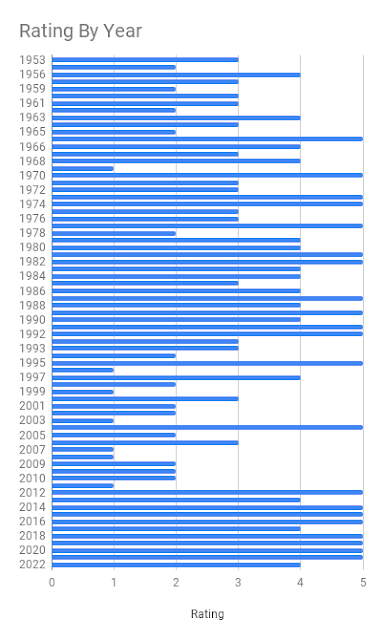Thoughts on the Hugo Novels
Well, I did it. I didn't think it would take eleven years when I started, but I read all 71 books that have won the Hugo Award for Best Novel to date. I am not counting and did not seek out the handful of "Retro Hugos" because those were awarded much later and part of the point of this exercise for me was seeing what books were celebrated in their first publication year, not by later audiences looking back.
It's been a long time in my life as well as the world, and so I wonder if any of my experiences of the first few books on the list would be the same now. My tastes and opinions have shifted and (I think) matured, partially through this very experience!
A few of the earliest books I read in their entirety in the gorgeous Rose Reading Room in the NYC Public Library, as they were "rare" copies that couldn't leave the building. The most recent books were read on the Kindle App on my phone, in my home on the West Coast.
It was interesting to watch various social movements and historical events be reflected in the books. Of course, art reflects its time, even in science fiction and fantasy. For example, while Stranger in a Strange Land is the earliest and most notable, it's not the only book that has a thread that presumes that future "enlightened" societies will be having tons of casual sex. You stop seeing that idea entirely by the 80s (i.e., AIDS). Even the most "forward-looking" books written by white men often don't foresee equality between the sexes or races (or that homosexuality would ever be accepted). Dystopias are nuclear dystopias in the 50s and 60s, environmental catastrophes in the 70s, and all-out climate collapses lately.
At the same time, ideas recur. The best science fiction, we seem to agree, has a great story and also grapples with big ideas. Religion, morality, humanity, empire, societal structure, etc. What does the best and worst of humanity look like and what is it capable of?
A few more personal reflections: I realize that I loved a lot of the most recent books, and that may well be a reflection of the fact that they are written now and I am living now. However, I also enjoyed many past winners from the 70s, 80s, and 90s. According to my ratings, the list really tanks in average quality (in my opinion) from the mid-90s through the 00s. Looking back, I wondered if some of my opinion was due to reading many of them in 2020/2021, but the trend started well before the pandemic.
And briefly, the best and the worst:
Hugo Winners I rated 1 Star:
- 1969, John Brunner, Stand on Zanzibar
- 1996, Neal Stephenson, The Diamond Age
- 1999, Connie Willis, To Say Nothing of the Dog
- 2003, Robert J. Sawyer, Hominids
- 2007, Vernor Vinge, Rainbows End
- 2008, Michael Chabon, The Yiddish Policemen's Union
- 2011, Connie Willis, Blackout/All Clear
I found these books variously boring, unpleasant, dull, and infuriating. It's interesting that although I was so happy to be done with Heinlein when I finished his last winning novel, I didn't dislike any of his books enough to give them a 1. Connie Willis, meanwhile, annoyed me to distraction twice.
Hugo Winners I rated 5 Stars:
- 1966, Frank Herbert, Dune
- 1970, Ursula K. Le Guin, The Left Hand of Darkness
- 1973, Isaac Asimov, The Gods Themselves
- 1974, Arthur C. Clarke, Rendezvous with Rama
- 1977, Kate Wilhelm, Where Late the Sweet Birds Sang
- 1981, Joan D. Vinge, The Snow Queen
- 1982, C. J. Cherryh, Downbelow Station
- 1987, Orson Scott Card, Speaker for the Dead
- 1989, C. J. Cherryh, Cyteen
- 1991, Lois McMaster Bujold, The Vor Game
- 1992, Lois McMaster Bujold, Barrayar
- 1995, Lois McMaster Bujold, Mirror Dance
- 2004, Lois McMaster Bujold, Paladin of Souls
- 2012, Jo Walton, Among Others
- 2014, Ann Leckie, Ancillary Justice
- 2015, Cixin Liu, The Three-Body Problem
- 2016, N. K. Jemisin, The Fifth Season
- 2018, N. K. Jemisin, The Stone Sky
- 2019, Mary Robinette Kowal, The Calculating Stars
- 2020, Arkady Martine, A Memory Called Empire
- 2021, Martha Wells, Network Effect
In my opinion, these are the best of them. And there are lots! Classics, adventures, and thoughtful experiences with fascinating ideas and great characters. Yes, I feel conflicted about Speaker for the Dead, but it's still an amazing, moving novel despite the fact that Card is an evil asshat. Some I expected (my beloved Bujold, Asimov, etc.), and some were delightful surprises.
I'm glad I did this project, but it feels a bit odd after all this time to be caught up. I guess now I need to actually attend a WorldCon? Ehh...maybe eventually.



Comments
Post a Comment
FYI: Most comments are moderated, and will not appear immediately.